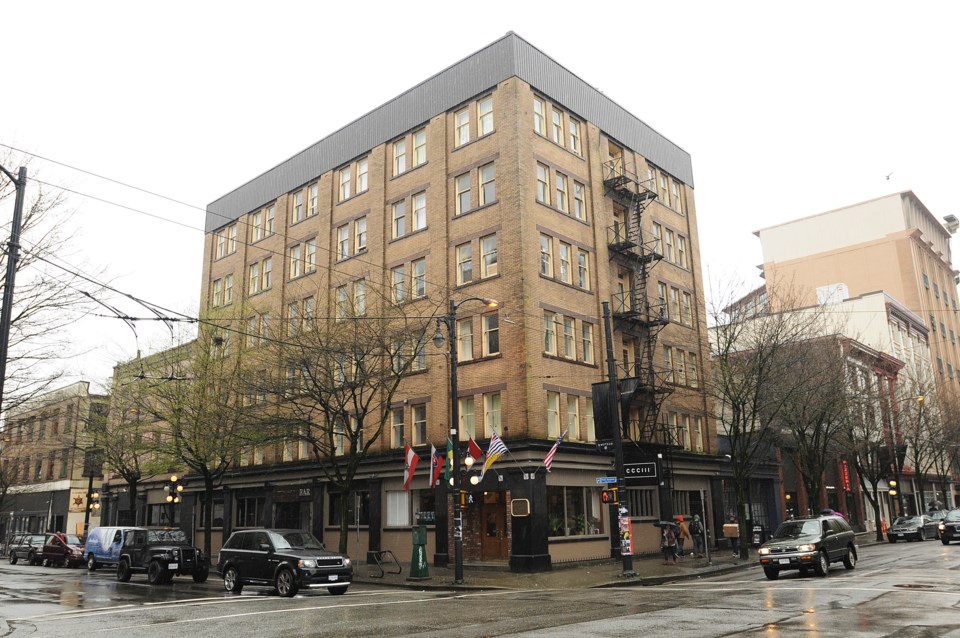A Downtown Eastside advocacy group working on behalf of low-income residents in the community says a survey it did of rents at 68 single-room-occupancy hotels revealed at least nine that charge up to $700 a month for accommodation.
The Carnegie Community Action Project says the findings are alarming and evidence of gentrification in a community where many residents receive only a $375 monthly allowance from the provincial government for housing.
“Do you want to know why we have homelessness on the streets now?” said Jean Swanson of the Carnegie group at a press conference Wednesday at the Carnegie community centre. “Well, [single-room-occupancy hotels] are being gentrified. Low-income residents are being evicted. Landlords are doing modest renos and seeking working people and students to replace the really low-income people.”
Though the City of Vancouver and B.C. Housing operate hotels in the Downtown Eastside, the Carnegie group focused its research on privately owned hotels. Group members posed as prospective tenants to collect rent data from desk clerks, managers and tenants.
The findings were put together in a report, On The Brink: The DTES Housing Crisis. Of the nine hotels renting rooms for up to $700 month, which included the American Hotel, Alexander Court, Golden Crown, Grand Trunk and New Columbia, all had raised the rents by $100 or more over the 2013 rate, the report said.
“Seven hundred [dollars] a month is almost twice what a person on welfare gets for rent and it’s $90 more than that person has for all their living expenses,” said Swanson, noting the $700 monthly rents applied to 445 rooms in the nine hotels, where tenants share washrooms and have no kitchen.
Swanson noted the rent increases come as more than 700 new market rental units are being built in or near Chinatown, with only 11 social housing units among the mix.
Wilson Liang, a member of the Chinatown Concern Group, said the community needs more housing for Chinese seniors, many of whom were playing cards in a room at the Carnegie during the press conference.
Liang said he is worried more development will lead to the demolition of low-income housing stock for seniors who can’t afford expensive condominiums.
“The current Chinatown developments are like a deep water bomb that sends out not only a ripple effect but a shockwave,” Liang said. “This shockwave will spread throughout Chinatown and the whole Downtown Eastside area.”
The group listed several recommendations for all three levels of government to act upon, including an increase to welfare rates, build more social housing, impose rent controls and commit to a national housing plan.
At the city level, the report recommended a series of requests, including the city being more forceful with its standards of maintenance bylaw to crack down on hotels in disrepair, lease hotels to non-profits to keep them from being gentrified, designate land for social housing and stop market housing development in the Downtown Eastside until the hotels are replaced with “safe, secure, self-contained and resident-controlled low-income social housing and [then] no one needs to sleep on the streets or in shelters.”
The Carnegie report was released the day after Mayor Gregor Robertson conceded that he hadn’t met his goal to get hundreds of homeless people off the street and into shelters or homes by 2015.
At a press conference Tuesday, Robertson said one of the reasons for homelessness was tenants of single-room-occupancy hotels being displaced during renovations, or what’s commonly been referred to as “renovictions.”
On Thursday, Robertson successfully tabled a motion at city council that asks the renters’ advisory committee to review the Residential Tenancy Act and “identify potential changes to increase resources and strengthen protections for renters and affordable rental housing.”
Vision Coun. Kerry Jang, who has been his party’s lead councillor on the housing file and supported the mayor’s motion, defended council’s efforts to get people off the street and into decent housing.
“They want us to enforce the standards of maintenance bylaw, so we have,” Jang said. “But we’re very careful about it because in order for the landlord to do his repairs, he has to get his money from somewhere, and that has meant raising the rents. So I don’t know what we can actually do with that. We can’t buy them, we can’t afford that.”
Jang said council’s goal is to create mixed-income buildings in the Downtown Eastside so market units can subsidize low-income units, despite protests from Swanson and other housing activists.
“They don’t like it because their entire goal is to have a completely government-subsidized low-income neighbourhood, exclusively for low-income people,” he said, noting the Downtown Eastside plan, which was developed with input from the community, was “very clear that mixed-income development was the only way the city could move forward.”
Jang said the ruling Vision council, which has been in power since 2008, has done more to get people off the streets than previous administrations.
He cited the city’s partnership with B.C. Housing to build 14 supportive housing buildings, the opening of shelters and temporary housing and a rent bank as evidence of council’s commitment to ending “street homelessness.”
Some of the Carnegie group report’s other findings include:
• Of 3,004 rooms surveyed, 2,444 rent for $425 or more.
• The average rent in privately owned hotels is $485, which is $110 more than the welfare shelter rate.
• Some hotels allow two people to share one small room and collect rent from both tenants.
• Between 2009 and 2014, the average lowest rents surveyed increased from $398 to $485 per month.
• Only nine per cent of hotels surveyed rent all rooms for $375 or less.
twitter.com/Howellings



